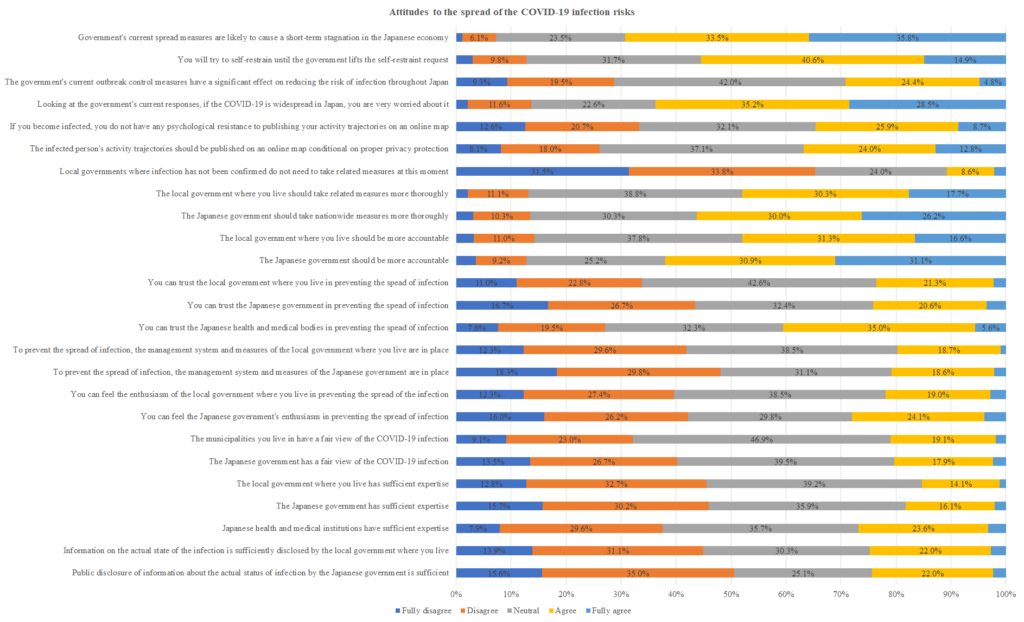Japan
The Lab of Mobilities and Urban Policy implemented a nation-wide questionnaire survey on the impacts of COVID-19 in Japan (1,052 persons were interviewed), at the end of March 2020: probably the first survey in all disciplines and in all geographical territories to investigate changes in various life aspects, caused by the COVID-19 pandemic.
[Preferred Citation] Zhang, Junyi, How Did People Respond to the Covid-19 Pandemic During its Early Stage? A Case Study in Japan (May 7, 2020). Available at SSRN: https://ssrn.com/abstract=3595063
Our lab implemented a nation-wide questionnaire survey about the impacts of Coronavirus (COVID-19) on transport and life in Japan in March 2020. In this survey, we asked 1052 respondents (from the whole Japan) to report changes in their daily activity-travel behavior, long-distance trips, other life activities before and after the Coronavirus event (between January and March), as well as their attitudes/opinions. Some preliminary results (1052 persons from the whole country) are shown below.
- The cancellation rates of various activities were mostly were over 40%, except those (20-30%) of eating out, railway (domestic) and other domestic travel. The cancellation rates for overseas sightseeing trips, concerts, and sports watching were close to 60%. Thus, the economic impacts of the spread of COVID-19 are obvious.


- Most people have knowledge of COVID-19, which has been widely reported through the government and the mass media. Thus, most people have shown a high interest in this new virus.

- People are receiving information about the spread of COVID-19 mainly through television and social media: spending up to 64 and 22 minutes each day.

- As for the reliability of various information sources, health and medical bodies were perceived to be reliable by 57.1% of the respondents, followed by the information released by local governments (56.3%). Differently, 54.3% perceived the information released by the central government to be reliable. The least reliable information is from workplaces and schools.

- About 80% of people think that the risk of infection in Japan as a whole is increasing, but only about 20% think that the risk of infection in their neighborhood/community is increasing. More than 60% think that the prefectures where they live have an increased risk of infection, while those who think they are very likely to be infected account for about 30%.

- Currently, the Japanese government has widely requested self-restraints. In the survey, 55.5% reported that they would like to self-restraint.
- More than half of the people think that (1)the government’s current spread measures are likely to cause short-term economic stagnation in Japan’s economy (69.3%), (2) they are very much worried, if the COVID-19 is widespread in Japan, looking at the government’s current responses (63.7%), (3)the Japanese government should be more accountable (62.0%), and (4)the Japanese government should take nationwide measures more thoroughly (56.2%).
- Less than 30% think that the Japanese government’s current outbreak control measures have a significant effect on reducing the risk of infection throughout Japan.
- In preventing the spread of the COVID-19 infection, only about 20% of the people trust the central and local governments, feel their passion, and believe that the management system and measures are in place.
- The percentages thinking that the central and local governments have enough knowledge to prevent the spread of the COVID-19 infection were only 18% and 15%, respectively.
- About 40% think that the health and medical bodies in Japan can be trusted in preventing the spread of infection.

The Second-wave of the Retrospective Panel Survey
In the first retrospective panel survey implemented in March 2020, we asked 1,050 respondents from the whole Japan to report changes in their lives between January and March. In the second retrospective panel survey, we asked these 1,050 respondents to participate again and refreshed samples because of drop-out. The survey will be finished soon: the target sample size is 2,000 respondents.
China
- Three papers on the spread of COVID-19 in China associated with regional/urban/transport planning and the built environment are under review.

Policymaking methodology
- Junyi Zhang (2020) Transport policymaking that accounts for COVID-19 and future public health threats: A PASS approach. Transport Policy, 99, 405-418.
- The novel coronavirus 2019 (COVID-19) outbreak has had wide-reaching and unprecedented impacts on the transport sector worldwide. At present, there is no globally agreed timeframe for when this pandemic will end. The current and near-future potential impacts must be addressed in a relatively comprehensive and seamless way. The present study proposed a PASS (P: Prepare–Protect–Provide; A: Avoid–Adjust; S: Shift–Share; S: Substitute–Stop) approach for policymaking that accounts for COVID-19 and future public health threats. The PASS approach was illustrated conceptually, and then policy measures were recommended by referring to the past and ongoing best practices. Policymaking challenges and research issues were discussed.
Comparisons of Policy Measures in Asia
The infections in Asia are becoming more and more serious. For example, as of October 30, 2020, the accumulative infections in South-East Asia already exceeded 9.0 million, which are still showing a rapid growth trend. This study compares transport related policy measures for addressing the impacts of COVID-19 in Asian countries (China, Japan, South Korea, Indonesia, the Philippines, Thailand, Cambodia, Lao PDR, Myanmar, Pakistan, Vietnam), and examines how policy measures are associated with the spread of the pandemic in different countries.
International Airlines
We are comparing the impacts of COVID-19 on countries with high dependence on tourism and examining the effects of various policy measures by considering inter-nation interactions.
Long-term Impacts and Roadmaps
We are investigating long-term impacts of COVID-19 on the transport sector and roadmaps for recovery from the current COVID-19 pandemic, based on international comparisons.
The Mekong Subregion
Research is ongoing, linked with the research”Cross-border Regional Development with Diverse Connectivity in Asian Developing Countries“, supported by JSPS.
